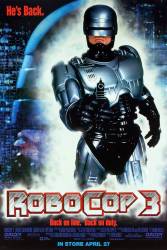Trivia: At least two of the characters in RoboCop 3 are based on Frank Miller's, (the film's screenwriter), own comic-book creations. 'Otomo' the cyborg samurai, pays homage to his "Ronin" comic about a masterless samurai whose spirit is reanimated with futuristic biotechnology. 'Bertha Washington', CCH Pounder's freedom fighter in the film, is a reference to Martha Washington, the freedom fighter from Miller's "Give Me Liberty."
Trivia: Nancy Allen didn't want to be in the film at all because Peter Weller wasn't in it. She eventually did agree to be in it, but she only wanted a small part. So her character was killed off early, as she requested, and all of the remaining scenes that were written for Anne Lewis were rewritten for a new character, 'Dr. Lazarus'.
Trivia: In RoboCop 2, the little league coach has no lines, appears on screen for a few moments, and even gets a listing in the credits at the end of the film. The same actor also appears in RoboCop 3 as the guy who defends the rebel base against Otomo, (he hits him with the metal pole), and even though he has several lines and appears on screen for a fair bit, he gets no listing in the credits for the film.
Trivia: RoboCop 3 was released in Japan first to see how the film was taken by the Japanese people as it featured a Japanese firm taking over an American one and Orion feared that the Japanese people might find this racist. This is one of the reasons why the film wasn't released until 1993 worldwide, even though it was made in 1991. Another reason is that in the meantime, Orion went bust and MGM bought Orion and released all of their currently unreleased films.
Trivia: When Kanemitsu is talking to the CEO and is being translated by the computer, this was achieved by using the SAY program on the Commodore Amiga, a home computer released in 1985-1994.
Trivia: The production company Orion mandated that the film be made PG-13 in order to increase profits, after discovering that the first two films had a strong appeal and fanbase in older children and teens. Ironically, this tactic backfired, as many critics and series fans complained that the film was far too childish in comparison to the prior releases, and it under-performed at the box-office.






